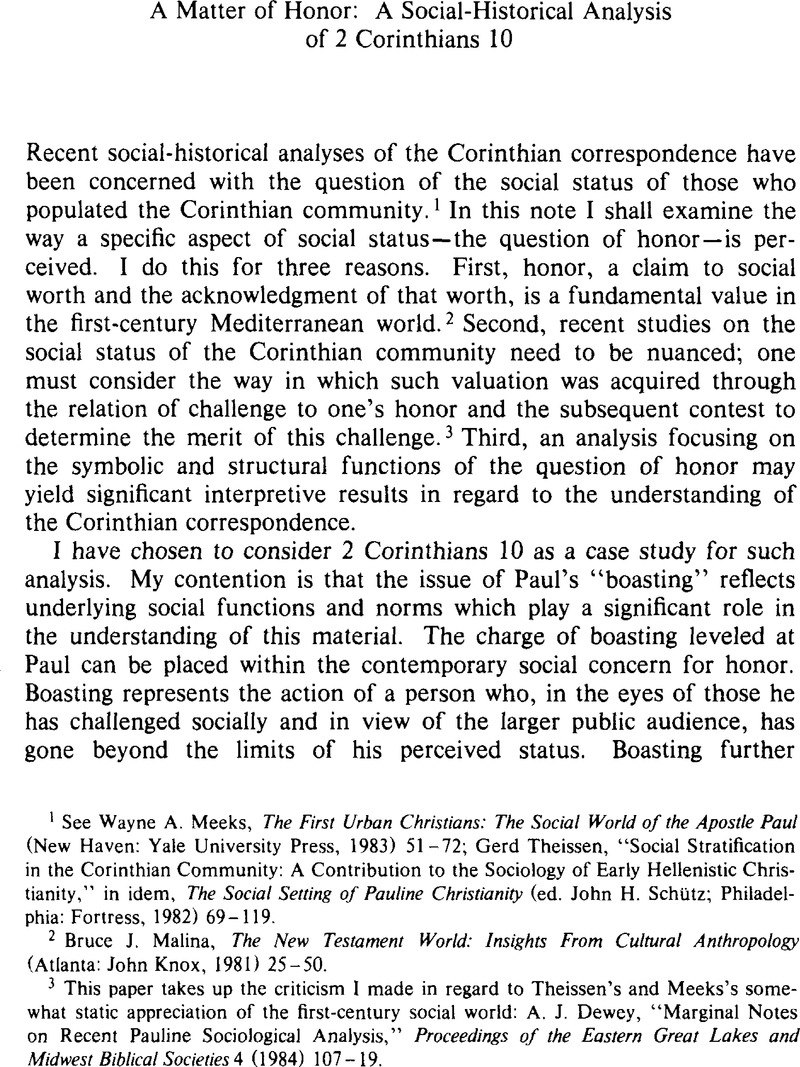Published online by Cambridge University Press: 10 June 2011

1 See Meeks, Wayne A., The First Urban Christians: The Social World of the Apostle Paul (New Haven: Yale University Press, 1983) 51–72Google Scholar; Theissen, Gerd, “Social Stratification in the Corinthian Community: A Contribution to the Sociology of Early Hellenistic Christianity,” in idem, The Social Setting of Pauline Christianity (ed. John H. Schütz; Philadelphia: Fortress, 1982) 69–119.Google Scholar
2 Malina, Bruce J., The New Testament World: Insights From Cultural Anthropology (Atlanta: John Knox, 1981) 25–50.Google Scholar
3 This paper takes up the criticism I made in regard to Theissen's and Meeks's somewhat static appreciation of the first-century social world: Dewey, A. J., “Marginal Notes on Recent Pauline Sociological Analysis,” Proceedings of the Eastern Great Lakes and Midwest Biblical Societies 4 (1984) 107–19.Google Scholar
4 For a lengthy analysis of first-century perception of honor see Malina, New Testament World
5 Theissen, “The Sociological Interpretation of Religious Traditions,” in Social Setting, 181–91.
6 Bornkamm, G., “The History of the Origin of the So-Called Second Letter to the Corinthians,” in The Authorship and Integrity of the New Testament (Theological Collections 4; London: SPCK, 1965) 73–91.Google Scholar Georgi, Dieter, Die Gegner des Paulus in 2. Korintherbrief: Studien zur religiösen Propaganda in der Spätantike (WMANT 11; Neukirchen: Neukirchener Verlag, 1964).Google Scholar Dewey, Arthur J., “Spirit and Letter in Paul,” (Th.D. diss., Harvard University, 1982) 172–76.Google Scholar
7 1 Corinthians and 2 Cor 2:14–6:13; 7:2–4.
8 Betz, Hans Dieter, Der Apostel Paulus und die sokratische Tradition: Eine exegetische Untersuchung zu seiner “Apologie” 2 Korinthen 10–13 (Tübingen: Mohr-Siebeck, 1972).Google Scholar
9 Herodotus 7.14; Plato, Phaedrus 257c; Isocrates 3.42; Josephus Bell. 4.365; Ant. 7.95; 13.415. For further examples see BAG s.v., def. 1.
10 Horsley, Richard A., “Wisdom of Word and Words of Wisdom in Corinth,” CBQ 39 (1977) 228–31Google Scholar; cf. Philo Rer. Div. Her. 20–21. Note also 2 Cor 2:17; 3:4, 12; 5:6.
11 Philo, De virt. 171–74. Theophrastus Char. “alazoneias.”
12 Dewey, “Spirit and Letter,” 166–200.
13 Malina, New Testament World, 30–39.
14 Horsley, “Wisdom of Word,” 229. See also Dewey, “Spirit and Letter,” 159.
15 Philo De virt. 51–54, 80–81, 148, 161–68. cf. Dieter Georgi, “Socioeconomic Reasons for the ‘Divine Man’ as a Propagandistic Pattern,” in Fiorenza, Elisabeth Schüssler, ed., Aspects of Religious Propaganda in Judaism and Early Christianity (Notre Dame: University of Notre Dame Press, 1976) 27–42.Google Scholar
16 See below, 216–17.
17 Cf. vs 6, certainly an indirect challenge.
18 Georgi, Die Gegner, 31–49, 219–20, 254, 282–91.
19 Dewey, “Spirit and Letter,” 172–81.
20 Meeks, First Urban Christians, 114. For a critique of viewing the letter as a means of social control, see Dewey, “Marginal Notes,” 115–16.
21 Horsley, Richard A., “‘How can some of you say that there is no resurrection of the dead?’ Spiritual Elitism in Corinth,” NovT 20 (1978) 210Google Scholar n. 17.
22 Theissen, “Social Stratification,” 20–72. My reservation with Theissen's position is that I would see such epithets functioning simultaneously as theological and sociological terms.
23 Dewey, “Spirit and Letter,” 35–39 esp. 36–38 and n. 38.
24 Horsley, “Spiritual Elitism,” 211–12.
25 Georgi, Die Gegner, 229–30, n. 3.
26 Ibid., 229–34; Dewey, “Spirit and Letter,” 172–76.
27 See above, n. 10.
28 Dewey, “Spirit and Letter,” 167.
29 See above, n. 15.
30 Cf. 2 Corinthians 3–5.
31 2 Cor 5:10; 2:17; 12:19.
32 See above, n. 28; 2 Cor 3:18; 10:1, 7.
33 See above, n. 8.
34 Contra Theissen, “Social Stratification,” 106–10, and Meeks, First Urban Christians, 113–14.